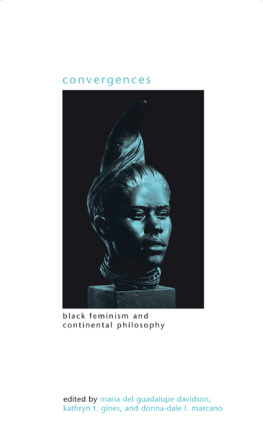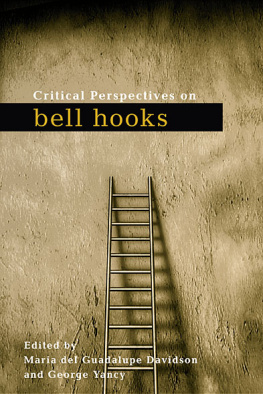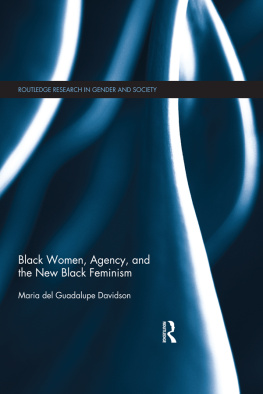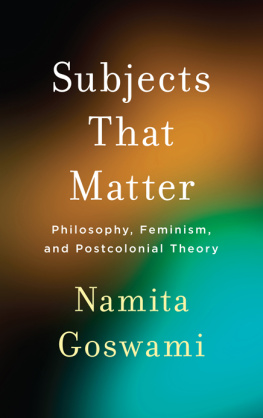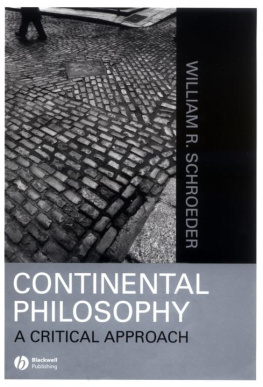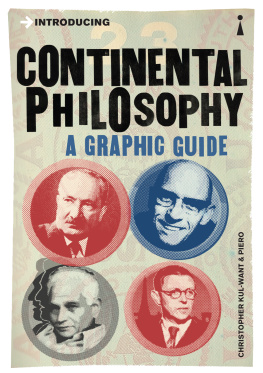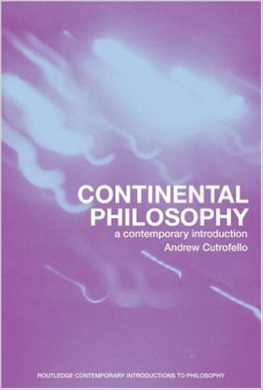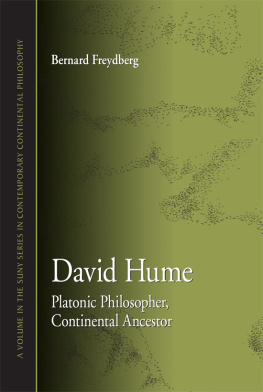SUNY series in Gender Theory

Tina Chanter, editor
Convergences
Black Feminism and Continental Philosophy
Edited by
Maria del Guadalupe Davidson
Kathryn T. Gines
and
Donna-Dale L. Marcano

Cover sculpture by Sohail H. Shehada
Published by State University of New York Press, Albany
2010 State University of New York
All rights reserved
Printed in the United States of America
No part of this book may be used or reproduced in any manner whatsoever without written permission. No part of this book may be stored in a retrieval system or transmitted in any form or by any means including electronic, electrostatic, magnetic tape, mechanical, photocopying, recording, or otherwise without the prior permission in writing of the publisher.
For information, contact State University of New York Press, Albany, NY
www.sunypress.edu
Production by Eileen Meehan
Marketing by Michael Campochiaro
Library of Congress Cataloging-in-Publication Data
Convergences : Black feminism and Continental philosophy / edited by
Maria del Guadalupe Davidson, Kathryn T. Gines, and Donna-Dale L. Marcano.
p. cm. (SUNY series in gender theory)
Includes bibliographical references and index.
ISBN 978-1-4384-3267-0 (hardcover : alk. paper)
ISBN 978-1-4384-3266-3 (pbk. : alk. paper)
1. Womanism. 2. Women, Black. 3. Feminism. 4. Continental philosophy. I. Davidson, Maria del Guadalupe. II. Gines, Kathryn T., 1978 III. Marcano, Donna-Dale L., 1962
HQ1197.C66 2010
305.48'896073dc2 2010005369
10 9 8 7 6 5 4 3 2 1
I dedicate this book to my husband, Scott Davidson. Thank you for your foundational love and abundant patience.
Maria del Guadalupe Davidson
For the first black feminist influences in my life: Kathleen Smallwood-Johnson, Kathryn Harris, and Serena Smallwood.
Kathryn T. Gines
For my grandmother, Clarissa Cupid, who provided comfort in these difficult times.
Donna-Dale L. Marcano
Foreword
Beverly Guy-Sheftall
[W]e are actively committed to struggling against racial, sexual, hetero-sexual, and class oppression and see as our particular task the development of integrated analysis and practice based upon the fact that the major systems of oppression are interlocking. The synthesis of these oppressions creates the conditions of our lives. As black women we see black feminism as the logical political movement to combat the manifold and simultaneous oppressions that all women of color face.
The Combahee River Collective, 1982
I have been preoccupied with documenting and analyzing the rich intellectual and activist tradition of African American women whose struggles around black feminist politics have been in recent years both celebrated and demonized. This painstaking work involved probing and making more visible the divergent philosophies embedded in black feminist theorizing among women and men since the midnineteenth century. Words of Fire: An Anthology of African-American Feminist Thought (New Press, 1995) and Traps: African American Men on Gender and Sexuality (coedited with Rudolph Byrd, Indiana University Press, 2001) are the two anthologies that have been most responsive to the erasures and silences surrounding the intellectual work among African American women and men that falls under the rubric of feminist thought/theory. In the preface to Words of Fire, I articulated what I meant by feminist: I use the term feminist to capture the emancipatory vision and acts of resistance among a diverse group of African American women who attempt in their writings to articulate their understanding of the complex nature of black womanhood, the interlocking nature of the oppressions black women suffer, and the necessity of sustained struggle in their quest for self-definition, the liberation of black people, and gender equality.
Despite our long history as producers of knowledge, the idea of black women as intellectuals, thinking women, has been elusive if not impossible to imagine. The American Negro Academy (ANA), the first learned society for persons of African descent in the United States and globally, was founded in Washington, DC, in March 1897 by Rev. Alexander Crummell, then seventy-eight years old. Born in New York City and educated at London's Queens College, Cambridge University, he was an Episcopalian minister, educator, writer, missionary, and one of the most prominent and visionary nineteenth-century black intellectuals. Though women were not barred from membership (whose numbers were limited to fifty), it remained an all-male organization during its thirty-one year existence (18971924). Its Constitution announces itself as an organization of authors, scholars, artists, and those distinguished in other walks of life, men of African descent, for the promotion of Letters, Science, and Art. Their overall goal was to lead and protect their people and be a mighty weapon to secure equality and destroy racism. Its specific objectives were to defend blacks against racist attacks; publish scholarship about the black experience by black authors; foster higher education and intellectual projects; promote literature, science, and art in the black community; and create a black intellectual elite, whom William E. B. Du Bois would later conceptualize as the Talented Tenth.
Since the ANA was conceptualized as an elite research institute, its major goal was the production of scholarly works that would assist in the overall struggle for racial equality. Eventually, they would publish twenty-two occasional papers. They met annually in DC, usually in late December, to hear research papers generated by their members. The wider public was also invited. Kelly Miller, a young Howard University professor, produced the first paper, A Review of Hoffman's Race Traits and Tendencies of the American Negro. The second paper was produced by Crummell, Civilization, the Primal Need of the Race, followed by Du Bois' Conservation of the Races. Alexander Grimke, who followed Du Bois as the third president, produced seven publications, including Right on the Scaffold, or the Martyrs of l922, The Ballotless Victims of One-Party Government, and The Shame of America or the Negro's Case against the Republic.
Despite its commitment to eradicating racial inequalities, the American Negro Academy reflected prevailing gender attitudes, as would subsequent black male-dominated organizations. At its first organizing meeting, a male member argued that women should be admitted and was assured by the other founding members that women could join, but no efforts were made to recruit black women. In 1898, Alexander Crummell invited prominent Anna Julia Cooper, clubwoman, intellectual, and author of A Voice from the South (1892), to present a paper at the second annual meeting, which was the only occasion during which a female presented. Contemporary black feminist scholars credit A Voice from the South with being the first book-length black feminist text produced in the United States. This collection of essays provides a global perspective on racism, imperialism, and colonialism; praises black achievements, especially those of women; promotes black women's education; and critiques black male sexism and the racism of white women. Despite the outstanding contributions of many black women during this era, among them Mary Church Terrell, Frances E. W. Harper, Fannie Barrier Williams, and Josephine St. Pierre Ruffin, none was ever invited to join the ANA. Though these and other black women intellectuals and activists assumed there existed a natural alliance between them and black men, they were rejected, ironically, on the basis of their gender.
Next page
